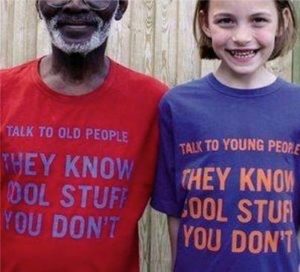 Last night I listened on Minnesota Public Radio to Bill Bishop give a speech at the Aspen Ideas Festival on the political polarization in America. (Click here to listen to the speech) He spoke about what he documents in his book, The Big Sort – Why the Clustering of Like Minded America is Tearing Us Apart. (Click here to buy the book on Amazon.com)
Last night I listened on Minnesota Public Radio to Bill Bishop give a speech at the Aspen Ideas Festival on the political polarization in America. (Click here to listen to the speech) He spoke about what he documents in his book, The Big Sort – Why the Clustering of Like Minded America is Tearing Us Apart. (Click here to buy the book on Amazon.com)
America is more diverse than ever, and our students today are more diverse than other demographics. However, the places where we live and visit on social media are more and more likely to be filled with people who live, think, worship, vote, and earn about the same amount of money as we do.
Sadly, this is nothing new. But while our divisions are not new, the 24/7 news cycle and the almost inescapable and omnipresent world of social media seem to be fueling the flames of our divisions.
In 1963, Dr. King called Sunday at 11 “the most segregated hour in this nation” meaning that churches were the most segregated places in an already segregated America.
When I worked at the Boys and Girls Clubs in North Minneapolis in the 1980’s, the 6-12-year-old side of the building included a great deal of diversity, but by the age of 13, there was far less diversity in the building.
In so many schools, in many parts of the country, the school cafeteria is a stressful place of division.
We need solutions.
As a solution to the stress of the lunchroom and to promote tolerance and acceptance, Teaching Tolerance has a great program called Mix It Up. Mix It Up at Lunch Day is an international campaign that encourages students to identify, question and cross social boundaries. Mix It Up at lunch this year is on October 31! Click here for more information and to sign up your school.
We don’t just need organized programs to help bridge our divides (although they certainly can help). but we absolutely need to make a conscious effort. Simple things we can do include:
Interact with people with a wide range of experiences: different ages and generations, diverse cultural and racial perspectives, from different countries, different socioeconomic status, different political affiliations, different interest levels in politics, different educational levels, different marital status, different faith than you, different denomination than you, different beliefs based on different perspectives, etc.
Search out different perspectives: in addition to interacting with people that are not the same as you, research stories from multiple perspectives and sources, read alternative explanations not only to disprove them, but to understand them.
Resist the tendency to provoke: think before you share on social media, fact check before you share, respond to the content of what others share and do not attack them personally, truly listen to other points of view, listen not just to respond but to understand, share not just your point of view but the logic and experiences that led you there, question others logic and facts but not the person
Respect differences, but seek commonalities. Most people are people of good will. It is amazing to me how much we have in common with all people, regardless of our differences. I challenge you to see if that is true. If it is, please share your experiences and commonalities. And if it isn’t, please let me know how wrong I am for believing that all people have much in common.
For us to unlearn to fear differences and hate will take a conscious effort on our part. Together, and only together, can we make the world a better place for all of us.